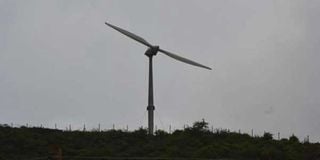Marsabit wind, solar power project halted as land dispute goes to court

A wind mill in Marsabit County. A land dispute in Marsabit has stalled the construction of a 300MW wind power and a 50MW solar project in Bubisa. FILE PHOTO | NATION MEDIA GROUP
What you need to know:
- The dispute is between some Marsabit politicians and Gitson Energy, a company owned by a group of Kenyans living in the US.
- Gitson Energy has already undertaken a feasibility study since 2007 to measure the speed of wind.
- The court ruled that the Commissioner of Lands had no powers to gazette the suit land, among other factors.
- The Attorney-General, representing the Commissioner of Lands, supported the appeal.
A land dispute in Marsabit has stalled the construction of a 300MW wind power and a 50MW solar project in Bubisa, months after a similar dispute scuttled a 60MW wind power project in Kinangop.
Such disputes have become the biggest drawbacks to Kenya’s quest for green energy.
The dispute is between some politicians in Marsabit County and Gitson Energy, a company owned by a group of Kenyans living in the United States.
Marsabit County has also been involved in attempts to stop the ongoing construction of 300MW Lake Turkana wind power project over issues relating to land rights.
The High Court in Meru declined to stop the project in November and called for arbitration between the parties.
The dispute between Gitson Energy and some Marsabit County leaders came after the leaders went to court seeking revocation of a gazette notice of 60,705 hectares of land for the wind project.
FEASIBILITY STUDY
Gitson Energy has already undertaken a feasibility study since 2007 to measure the speed of wind which showed that the area is viable for the project.
Court documents also show the project had in 2007been endorsed by the Ministry of Energy as part of contributing to Kenya’s green energy mix and the United Nations Development Programme (UNDP) for its sustainability potential.
The local community also supported the project.
Gitson Energy went to the Court of Appeal to overturn an April 2013 High Court judgment by Justice George Odunga which quashed the gazette notice of the land because the National Land Commission (NLC) was not involved.
The court ruled that the Commissioner of Lands had no powers to gazette the suit land, among other factors.
But Gitson Energy, through Kaplan and Stratton law firm, argued that by the time the setting apart was done in July 2010, NLC had not been formed. The setting apart by County Council of Marsabit was done before the promulgation of the 2010 Constitution and Transition to Devolved Government Act of 2012.
They argued that these laws cannot be applied retrospectively.
Marsabit leaders led by North Horr MP Francis Chachu Ganya, and Marsabit County represented by Okong’o Omogeni, urged the Court of Appeal to uphold the judgement given by the High Court.
The Attorney-General, representing the Commissioner of Lands, supported the appeal.
The setting apart was under Trust Land section 117 of 1969, in the (repealed) Constitution of Kenya, which is under area county council and not section 118 of 1969 which is an instant of government as contained in Justice Odunga’s ruling.
POWERS TO ADMINISTER LAND
The Commissioner of Lands under section 53 of the Land Act had powers to administer the trust land of each council as agent of the council, among other grounds.
The project is threatening to affect another project, Ketraco’s transmission line between Kenya and Ethiopia, as it is planned to pass through land that was initially allocated to Gitson Energy.
Recently, Gitson Energy wrote to Ketraco (Kenya Electricity Transmission Company) expressing concerns that if the transmission line passes through the land already allocated to the company, it may influence the outcome of the court case or interfere with the suit land while the matter is pending in the courts.
The case will determine the land ownership and the recipient of the way leave compensation running into millions of shillings.
KENYA-ETHIOPIA GRID
If these funds are paid to the wrong party, public funds could be lost.
The delay in the construction of the Kenya-Ethiopia grid which is funded by the African Development Bank (AfDB) will impact the connectivity between the two countries and cost Kenyan taxpayers more money.
Gitson Energy and the local community in Bubisa have lost income since the case was filed in 2012.
The Bubisa residents are to share profits with the company annually throughout the life of the project.
For the rest of Kenyans, it delays the access to affordable and clean power.
The ruling on the appeal was scheduled for early November 2016 but was postponed without a date being fixed.





